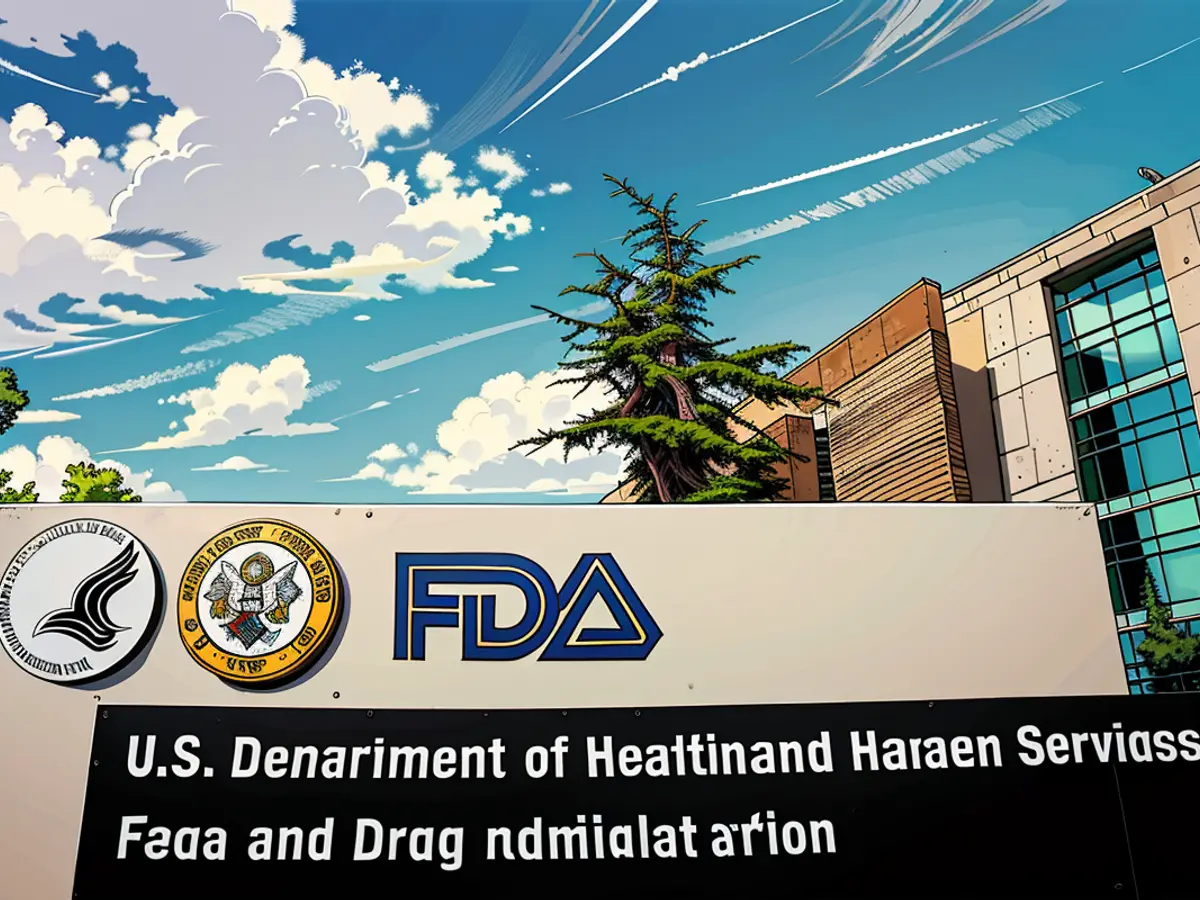"Never endured such pain before": Individuals bear the cost of unassessed food additives
By the end of June, Daily Harvest voluntarily withdrew the crumbles following 470 complaints of gastrointestinal, liver, bile duct, and gallbladder issues.
"I've never felt pain like that," Cory Silverstein told CNN Business at the time. Silverstein, along with his wife, who were influencers promoting the product, experienced health issues after consuming the crumbles. Silverstein's liver enzyme levels soared to 12 times the normal limit after eating the crumbles.
Another influencer, Luke Wesley Pearson, shared that he underwent emergency gallbladder surgery after consuming the crumbles twice. Moreover, two other consumers confided in CNN that they also underwent gallbladder surgery after ingesting the plant-based substitute.
Daily Harvest declined to comment for this report when CNN reached out to them.
Examination rules out contaminants
Initially, US FDA investigators suspected the illnesses were due to contamination at the manufacturing facility. However, the plant tested negative for pathogens. Daily Harvest then focused its internal investigation on a new high-protein ingredient: tara flour.
Tara flour is manufactured from the seed pods of a thorny shrub native to Peru. While tara gum, a product derived from the same plant, has been used safely for years as a food thickener, tara flour is different and has not been thoroughly studied or approved for use as a food ingredient in the US, according to the FDA.
“This was the first and only time we’ve used tara flour, which had been available and used in the North American market as a plant-based source of protein before our use,” Daily Harvest founder and CEO Rachel Drori announced in July 2022.
The company included tara flour in the crumbles under the FDA's "generally recognized as safe" (GRAS) designation, a category that provides manufacturers with flexibility to incorporate new ingredients in food without the need for extensive testing or approval procedures.
As consumers eventually learned, tara flour was not safe, the FDA declared in May 2024, nearly two years after the ingredient had affected hundreds of people. Despite this, other manufacturers may have used the now-unapproved food additive during that period.
“This incident highlights the broken nature of our food regulatory system. It's completely backward,” said Dr. Pieter Cohen, an associate professor of medicine at the Cambridge Health Alliance in Somerville, Massachusetts.
Cohen co-authored a study on the situation, published in The New England Journal of Medicine in September.
“No one is keeping an eye on the store. Tara flour is introduced into the food supply, and it takes an illness outbreak for the FDA to even consider whether or not it’s safe,” he said. “It’s even worse that it takes two years for the FDA to reach that conclusion, putting consumers at risk all this time.”
A history of inaction
Tara flour is just one example, but critics argue that misuse of the GRAS standard and the Food and Drug Administration's slow response have been prevalent for decades.
“Unfortunately for our nation's public health, GRAS is merely a loophole for food manufacturers to circumvent FDA oversight and get products onto store shelves more quickly,” Illinois Secretary of State Alexi Giannoulias said at a September press conference.
Food and beverage industry representatives disagree. Sarah Gallo, senior vice president of product policy and federal affairs for the Consumer Brands Association, told CNN via email that the industry strictly follows the FDA's rigorous “evidence-based pre- and post-market safety system” for food products.

“GRAS plays a crucial role in this proven system, allowing the industry to innovate and meet consumer demands while still adhering to FDA regulations and safety standards,” Gallo said.
How should GRAS be applied?
Manufacturers are required to conduct a comprehensive review of scientific literature or convene a panel of unbiased experts to determine if a new ingredient can be designated as GRAS and used in any food sold in the US. These requests for GRAS classification should be submitted to the FDA for approval before incorporating any new ingredients not in use prior to 1958 into a new product.
However, the FDA established a voluntary GRAS notification program in the late 1990s due to high demand for new food additive approvals. This program does not create legally enforceable responsibilities and leaves room for manufacturers to add new ingredients without guaranteeing that regulators have been informed as well.
According to the FDA's 2010 report by the US Government Accountability Office, the agency does not have information about other GRAS determinations companies have made because they are not obligated to inform the FDA about them.
A 2014 study conducted by the Natural Resources Defense Council, a environmental advocacy group, utilized Freedom of Information Act demands to inspect how corporations interact with the FDA regarding new food additives. This examination revealed that 56 businesses seemingly utilized unacknowledged Generally Recognized as Safe (GRAS) safety evaluations for 275 substances. When the FDA received a GRAS request from a producer, the report indicated, the agency was comprehensive, denying or prompting the withdrawal of 1 in 5 requests.
A more contemporary 2022 examination led by the Environmental Working Group found that about 99% of new chemicals employed in food or food packaging since 2000 were authorized not by the FDA, but by the food and chemical industry. During that period, food manufacturers sought the FDA's authorization to introduce a new substance only 10 times, as per the analysis.
“The food industry has received a pass for decades in terms of food chemical safety,” said Melanie Benesh, vice president of government affairs for the Environmental Working Group. “By exploiting this loophole, industry has been able to rely entirely on their own science to determine whether or not an ingredient is safe. And they have been able to downplay some of the increased disease burden that may come with some of the products they produce.”
When CNN inquired whether the FDA would reassess the GRAS premarket process, the agency referred to the necessity of Congress to address the issue.
“Congress writes and enacts laws; it is the FDA’s role to implement laws as written,” an FDA official said in an email.
“Food manufacturers are responsible for marketing safe foods, including ensuring the safety and regulatory status of the ingredients they use in foods before they are available to consumers.”
States and European Union in the lead
Detractors argue that the FDA's lack of action and slow response have left the agency playing catchup, following more aggressive measures proposed by states.
In October 2023, California banned four substances — brominated vegetable oil or BVO, potassium bromate, propylparaben and red dye No. 3 — due to serious health concerns such as cancer, endocrine and reproductive issues, and heart and liver problems.
Additional chemicals being targeted by legislative bills in 11 states include red dye No. 40; blue dye No. 1 and No. 2; green dye No. 3; yellow dye No. 5 and No. 6; titanium dioxide; and azodicarbonamide, a dough conditioner also used in yoga mats, according to the Environmental Working Group.
The FDA had declared BVO — a vegetable oil used in citrus sodas and sports drinks — no longer GRAS in 1970, but the agency did not officially ban the additive from use in the US food supply until July 2024.

“The FDA knew for decades that brominated vegetable oil or BVO would be harmful, but it was allowed to remain in use at the request of food manufacturers,” said Giannoulias, a coauthor of the Illinois Food Safety Act, which was passed by the Illinois Senate in April 2024.
The FDA banned red dye No. 3 from use in cosmetics and externally applied drugs due to a link to thyroid cancer in animals in 1990, but despite petitions from advocacy groups, the agency continues to allow the dye to be used in thousands of foods, dietary supplements, and ingested drugs.
“BHA (butylated hydroxyanisole) is another food chemical linked to cancer, used in thousands of foods ranging from cured meats to kids’ cereals,” the Environmental Working Group’s Benesh said. “A doctor petitioned the FDA to ban it in 1990, but 34 years later, the petition is still pending, and the FDA has yet to respond.”
The European Union determined that bisphenol A, commonly known as BPA, “was harmful at hundreds of times lower levels than what was previously considered safe,” Benesh said. However, a petition for action filed with the FDA in 2022 is still waiting the agency’s response, she added.
The Consumer Brands Association pointed to recent GRAS actions by the FDA, including an updated 2024 list of chemicals the agency plans to review.
According to critics, however, the list contains chemicals already targeted by states, chemicals not directly added to food or packaging, and chemicals that have been under FDA review for years without action. Even today, critics say, the FDA lags behind modern science.
FDA sets a new course
Facing years of criticism, the FDA announced a new Human Foods Program in 2023, which includes a new method of post-market analysis of chemicals already present in food — including those that bypassed the voluntary GRAS requirements.
“There is no statutory requirement for FDA-initiated post-market review or for the industry to conduct safety testing and to share that data with FDA after a chemical is introduced into the market,” Jim Jones, the FDA’s deputy commissioner for human foods, told more than 300 attendees last month at the first public hearing on post-market review.
“As such, given our limited resources, the agency has not established a systematic process to ensure that our original determinations of safety held up over time,” Jones said.
The FDA action comes after a more recent GAO analysis that found that the agency did not track information in a manner that would allow it to quickly identify substances that needed to be examined “because new safety information may have emerged.”
The FDA's proposed strategy encompasses a wide range of topics, including edible substances and colorings, materials used in food packaging, potential hazardous impurities and pesticides, and substances deemed Generally Recognized as Safe (GRAS) previously.
While this new strategy might enhance supervision over existing market chemicals, detractors argue that it fails to tackle the regulatory gap permitting harmful ingredients to be incorporated into food without prior safety assessments.
As stated by Thomas Galligan, principal scientist for food additives and supplements at the Center for Science in the Public Interest, a consumer rights group, during the recent FDA meeting, "The FDA should reconsider its entire GRAS procedure and make improvements to safeguard public health by alleviating the workload on the post-market review process."
"Firms are making covert judgments regarding the safety of food additives, and the FDA cannot guarantee the safety of our food supply."
The FDA's investigation initially suspected contamination at Daily Harvest's manufacturing facility as the cause of the health issues, but tests revealed that the plant was free of pathogens. Daily Harvest then turned its focus to a new high-protein ingredient, tara flour, as a potential source of the problem.
Despite the fact that tara gum, a derivative of the same plant, has been used safely as a food thickener for years, tara flour had not been thoroughly studied or approved for use as a food ingredient in the US before Daily Harvest included it in their crumbles. This was the first time tara flour had been used in Daily Harvest's products.









